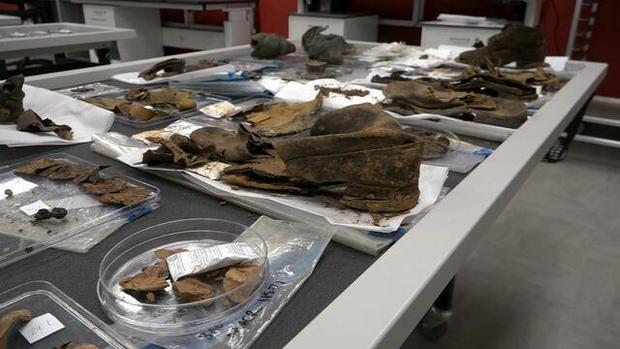America keeps faith with its unknowns.
At Arlington National Cemetery, a revered ritual salutes the service members who were killed in action but whose bodies were never identified.
At the Department of Defense, one division works to bring home the tens of thousands of unidentified soldiers. At the Defense POW/MIA Accounting Agency, experts like forensic anthropologist Carrie Brown spend years using DNA, dental records, sinus records and chest X-rays to identify the remains of service members killed in combat. The Nebraska lab that Brown works at has 80 tables, each full of remains and personal effects that can work to solve the mystery.
CBS Saturday Mornings
One set of remains — belonging to a soldier who was on a B-17 plane that went down in a German field — was found with a wedding ring. This information helps identify a body, but Brown said it’s also emotional to see what the service member’s life was once like.
“The poignant moment for me is when you’re looking at items that a person had on them when they died,” Brown said. “When this life-changing event occurred. Life-changing for him, for his entire family, for generations to come.”
Meanwhile, Judy Wade’s family knows all about generational grief. Army Corporal Luther Story, her uncle, was killed on Sept. 1, 1950, in Korea. During one battle he killed or wounded 100 enemy soldiers, according to his Army citation. The 18-year-old died protecting his unit, earning him the Medal of Honor. But for decades, his remains went unidentified.
“My granddaddy just never would let that go,” Wade said. “The fact that his baby had gone off to war and died and didn’t come home.”
Another family who kept hope alive was the Barber family, who lost three sons when the Pearl Harbor capsized during the attack on Pearl Harbor. Malcolm, LeRoy and Randolph Barber were among the hundreds killed, but eventually, Carrie LeGarde’s team identified 362 remains from the wreck and returned them to their families.
“It’s hard not to be emotional about what happened to them and what they went through and what their families went through,” LeGarde said.
Since 2015, the DPAA has identified nearly 1,200 soldiers, sailors, airmen and marines, using remains returned from 45 countries. One of those bodies was that of Wade’s uncle, who was finally identified 73 years after his death.
“It was like every brain cell I had like, exploded in my head,” Wade said. “My whole body (skipped a beat). I always had a fantasy when I was a child that he really hadn’t died. That somehow he had survived and someone had taken care of him. He was going to come home. Well, he’s coming home now.”
Story will be laid to rest on Memorial Day in Andersonville, Georgia.
Stay connected with us on social media platform for instant update click here to join our Twitter, & Facebook
We are now on Telegram. Click here to join our channel (@TechiUpdate) and stay updated with the latest Technology headlines.
For all the latest Entertainment News Click Here


